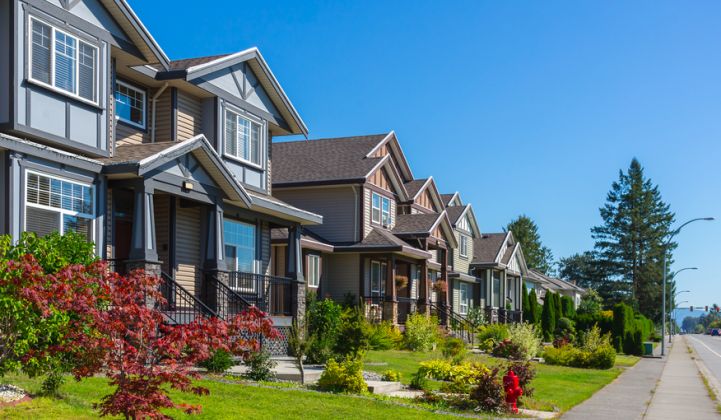U.K. energy firm Geo hopes to install batteries in 50,000 new homes a year by 2020 amid growing energy storage interest in the homebuilding sector.
The figure represents half of all new-build homes in the U.K., but Geo chief strategy officer Simon Anderson said it is realistic, based on European Union moves to promote smart buildings. Despite Brexit, “My view is what goes on in Europe will still affect the U.K.,” he said.
Geo started out 10 years ago in the smart thermostat field and has since extended its offering into what Anderson calls the “hybrid house,” which combines smart monitoring technology with energy storage and demand management.
This month, the company is hoping to launch a prototype hybrid house, with field trials in the summer of 2017 and a commercial launch in 2018.
The concept is based on the hybrid vehicle idea of using storage to improve the efficiency of traditional power systems, and could lead to a one-third reduction in energy costs for traditional homes and two-thirds for households with residential solar.
“There will always be 10 percent to 20 percent [consumption] from the grid, even with solar,” said Anderson.
Geo's energy storage solution will not be something that individual homeowners can opt for, however, since the idea is to offer it as an existing asset with new homes. Geo is looking to provide hybrid home packages as an optional extra that property developers can use to sweeten the deal for homebuyers and, increasingly, meet regulatory requirements.
"We are focusing on new build," confirmed Anderson. "Our customers will be housing developers and utilities."
The utilities are also part of the picture because "property companies have to hand over the energy system," he said.
Geo expects utilities to be able to offer a hybrid home tariff that reflects the greater efficiency of the system, which will include an 8-kilowatt-hour battery from an unspecified vendor.
Anderson said residential property developers in places such as London are “very interested” because it can help them meet mandated and voluntary energy efficiency targets.
Sonnen and Moixa target builders
Besides the U.K., Geo is active in the Nordics and “making inroads into Benelux,” said Anderson, “because they have a local data port on the meter. Having a smart meter with local live data is fundamental.”
However, Geo will face increasing competition on the home front. The German battery maker Sonnen, for example, is actively targeting house builders with its Eco Compact product, launched earlier this year.
“Builders could use Sonnen to roll out battery solutions across a range of homes,” reports TecHome Builder.
In the U.K., the energy storage firm Moixa is looking to sell a GBP£4,995 ($6,240) 2 kilowatt-hour smart battery system and 2-kilowatt solar system to housing associations and landlords, as well as homeowners.
Residential customers will typically benefit by around £350 ($440) per year in electricity savings from their solar panels and battery and from feed-in tariff payments, said the company in a press release.
They will also receive £50 ($60) in annual payments for making their battery capacity available through Moixa’s GridShare aggregation platform.
Stroomversnelling's net-zero-energy homes
Meanwhile in the Netherlands, an organization formed by four construction companies, called Stroomversnelling, is looking to create a portfolio of net-zero-energy homes by 2020.
The collective aims to use solar panels in place of roof tiles in order to halve rooftop PV installation costs. The roofs will be installed in a week's time or less and will come with a 30-year guarantee.
Along with thermal recovery and low-power-consumption devices, Stroomversnelling believes it can reduce the effective energy use of households to virtually zero.
Batteries are not presently part of the equation, although Stroomversnelling has reported conversations with LG.
Like Geo, Stroomversnelling does not anticipate selling the concept directly to homeowners, since many would shy away from the upfront cost for fear of losing their investment if they move away.
Instead, Stroomversnelling envisions working with developers to offer homeowners a fixed-fee energy tariff that represents savings on utility supplies and includes with a 5 percent payback for the building developer.
Stroomversnelling already has a deal to create 111,000 net-zero-energy homes for six Dutch housing associations by 2020.
After that, it hopes to install PV as standard on all new-build construction, as well as refurbishing 50,000 homes a year, in order to meet the Dutch government’s target of having 60 percent net-zero-energy homes by 2050.



